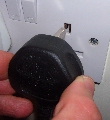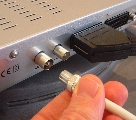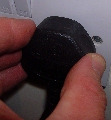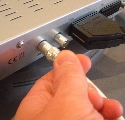My Freeview box has no EPG, is blank on FIVE, ITV3, ITV4, ITV2+1, has no sound o
 Brian Butterworth published on UK Free TV
Brian Butterworth published on UK Free TV To deal with the problem you must clear the channel list completely and then rescan - if your box has it in the menus, please the 'installation menu' to do an initial scan or a reset to factory settings or First Time Installation. You MUST delete the entire existing list of channels. On most boxes this technique can be also be used:
Try this:
1) unplug your Freeview box (or idTV) from the mains;

2) unplug the aerial from the Freeview box by disconnecting the cable from the 'RF in' socket;

3) wait 30 seconds;
4) plug Freeview box (or idTV) mains back in;

5) do a complete scan for channels - it will fail without the aerial. (This may be in the installation or initialization menu, and is distinct from any 'add channels option'). Once this is done your channel line up should be empty;

6) reinsert aerial by reconnecting to the 'RF in' connection;

7) do a complete scan for channels again.

The Freeview channel line-up provided by six "multiplexes" - each of which carry five or more TV channels, radio channels, text services and EPG data. In this diagram each ROW represents a multiplex. If you are still missing a whole multiplex (ie everything on the row) you may need to replace your aerial with a wideband type, purchase a larger aerial or you may have interference from a VCR, games console, Sky Digibox or similar.
7:36 PM
David Warner:
Did you use the links provided then? I'm guessing not based on your further post on another page. Unfortunately this site has messed up the link to the Platform Management page (but you had the other option), you can get to it easily by scrolling to the bottom of the Freeview Home page and clicking the link under Corporate.
Just because you have "apparently perfect reception" of other multiplexes is NOT a compelling argument that you don't have overly high signal levels. How a set front end handles too much signal depends on it's front end design, some do it well with no obvious problems, some show immediate picture or sound breakup but quite often the sensitivity is reduced and so it can become "deaf" to weaker signals. And I already explained about the Transmission Mode for the Local multiplex which is why the coverage is "better" with lower power.
You said "this local low power multiplex comes in so strongly from Crystal Palace to Brixton that you don't need an aerial to receive it". You also said "The TV I use has a sort of signal strength indication - but this seems a bit unreliable." That's something else that can happen with too much signal, I did mention that a receiver "could falsely show less than 100% signal"
You have a 20 element yagi 3 miles from CP, that IS a compelling argument that you MIGHT have too much signal even when considering the railway viaduct.
But before I comment further on experimenting, we'll mention the trees. I'm going to quote part of an article written a few years ago by Bill Wright, a very experienced TV engineer, it was in analogue days, but the principles are EXACTLY the same for digital signals.
"The customer will say that he's enjoyed perfect receptionor what he regards as perfect receptionsince the days of John L. Baird.
Those trees have always been there and they've never affected reception before', he'll declare.
The dreaded credibility gap looms up in front of you! In reality the customer has probably always had rather unreliable reception, but it's never been quite this bad. Why does it happen? Why does one channel just disappear? The cause of the problem is multipath reception through the trees. The signal takes a number of different paths through the leaves and branches. In the simplest case, if signals following two such paths arrive at the aerial more or less in phase no great harm is done. But if they chance to arrive exactly out of phase and of equal strength the result is no signal. It's never quite as clear cut as this of course. The signal may take a multitude of paths, resulting in a complex and unpredictable pattern of standing waves, or peaks and nulls, at the receiving site. Because a relatively minor change in the tree structure can completely alter this pattern, reception can be acceptable for years until a null happens to occur precisely at the aerial location. Normal movement of the trees, even on fairly still days, is enough to cause great variations in received signal strength."
So, just to complicate matters further, the FEC change to COM8 will have had the effect of improving the signal in a lot of places, often seen an increase in signal strength (that could tip your front end just over the edge) BUT this isn't only seen just when using an omni-directional receiving aerial (that's really more applicable to DAB) as TV aerials have "side-lobes", "front-to-back ratios" aren't always the best, and another transmitter with an "Interfering signal" may well be within the beam-width of the receiving aerial. So in other words reception can become better or worse, it very much depends on location and those factors mentioned.
So what next. Well you MAY have a combination of multipath and too much signal.
Assuming the aerial is in exactly the same position as it was when you had good reception of COMs 7&8 then it seems to me that spending a fiver on a variable attenuator is a small price to pay for a bit of experimenting without which you have no clue as to what is going on.
This is where I would start. See what happens to your reception and set's signal strength for all multiplexes as you increase the attenuation. Assuming either that's not the problem or only part of it, then I'd try repositioning the aerial, not just tipping it or altering the bearing, move it several inches or even feet, taking care of where any metal objects, solar panels, roof flashing etc are, and trying to ensure they are not in close proximity or line of sight. Apart from this possibly changing the received strength, it'll probably have some effect on any multipath.
If you still haven't got a satisfactory result, try one of the other aerials. CLEARLY the Group A are NOT the ones to try. So you've mentioned the 10-element and also a Log-periodic, both will have different characteristics, so experiment. RF can be a bit of a black art, it's a case of suck it and see in this sort of situation.
| link to this comment |
10:07 PM
Northampton
Douglas Kattenhorn: Hello Douglas If you get this, contact us - details below.
David and Pat Downham (46 NN4 6AT) Northampton.
| link to this comment |
David's: mapD's Freeview map terrainD's terrain plot wavesD's frequency data D's Freeview Detailed Coverage
11:21 PM
David Warner:
I would concentrate on your COM7 signal. It's just been announced at short notice that COM8 is to close on June 22nd see 22 Jun 2020 - Important channel broadcast changes | Freeview
| link to this comment |
8:19 PM
Newry
After recent notice that service might be affected during work on Newry North Transmitter I nitice that Mux for BBC channels is faulty. Did a Automatic rescan on two tvs ,one says no signal, other is pixilated. I live 200 m from Newry North Transmitter at BT34 1QN
| link to this comment |
Gerry's: mapG's Freeview map terrainG's terrain plot wavesG's frequency data G's Freeview Detailed Coverage
11:56 PM
Gerry C:
Obviously living that close to this transmitter, I assume you can see it, and your aerial will be pointing at it. Where (and when) was this " recent notice that service might be affected during work on Newry North Transmitter".
The Newry North Transmitter has not been listed by Freeview for Planned Engineering recently and neither are they listing any faults, nor has the BBC listed any in the last 5 days.
There are two other transmitters close to you. It is not uncommon for aerials to pick up other signals from "side-lobes" even towards the rear of the aerial. The Freeview Detailed Coverage Checker doesn't predict any reception from the Newry South transmitter except poor reception of the BBC B multiplex, however it predicts good reception from Camlough and the BBC did list a fault here. Also whilst the Leitrim transmitter is much further away, you are predicted to get some reception from it and its bearing will be within the beamwidth of your aerial pointing at Newry North.
All these transmitters are relays off Divis which is currently listed for Planned Engineering with "Possible weak signal" so it may be that there could be some disruption of service to the relays. I'm wondering if it's likely that if Newry North was briefly off-air (for whatever reason) that an automatic rescan has picked up signals from one of the other transmitters which will be somewhat weaker than you'd expect from the aerial pointing at Newry North.
If you can enter the TV Tuning section and look for which UHF channels it has tuned to (you may find these in something like Signal Test or Manual Tuning, it should be UHF C22 for BBCA, C25 for D3&4, and C28 if you have HD (BBCB). If you can't do that, then it may be best to try a further retune, but as follows -
First unplug the aerial and carry out an automatic retune, this should clear all previous tuning as nothing should be found. Then plug the aerial back in and repeat the retune and hopefully all channels should be correctly restored.
If you still have a problem after that, it would be a good idea to check all you coax connections, flyleads, coax cable for condition and that the aerial is still pointing the correct way with the rods vertical.
| link to this comment |
3:46 PM
My tv says "weak or no signal". This always happens if there is bad weather such as rain or high winds. Sometimes it doesn't! Why? At the moment my screen is blank with that message. Can you help me?
| link to this comment |
11:51 PM
Caroline poulter:
I'm afraid we need a full postcode to see what the Freeview Detailed Coverage Checker gives for predicted reception at your location. We've no idea which transmitter(s) and multiplexes you may receive, you may be in a poor signal area, you may have a problem with your installation.
| link to this comment |
Chris.SE: Re COM7 and the new fully integrated BBC Four HD PBS America +1 SD etc, having gone through the phase of getting BBC Four HD on Freeview channel 798, and PBS Am+1 on 788, all you get now is a pop-up instructing you to retune.
I mistakenly did so - and have now reduced my channel count from 118 to 106.
No COM7 and no PBS America +1
FYI RxTV say: 209 and 7xx channels were on COM8 - a temporary dual transmission, while the new versions of the channels took the regular channel numbers.
COM7 reception is currently poor in many areas due to the current weather conditions.
Nice to know - but will COM 7 come up anyway (should the weather conditions improve) - you know I've been unable to get COM7 for at least 4 months now. (though I could get COM8).
| link to this comment |
8:02 AM
David Warner:
Did you have a good read of my previous long reply to you on Tuesday, 2 June 2020, especially the bit about trees and multipath reception. I'm afraid you are just going to have to experiment a bit (maybe will all the things mentioned).
The tropospheric ducting may have subsided enough by this evening, but some could/might return midweek, other than that, we aren't expecting any changes to the COM7 signal.
Oh, btw, COM7 from CP could be the 84kW I mentioned previously (not 43kW as mentioned in various places) there could be several errors in OFCOM documents, and the question has been asked!
| link to this comment |
I tried the unplug everything and then re tune to blank, then re tuned again, well thank you, it worked, I now have it all back, well done!!!
| link to this comment |